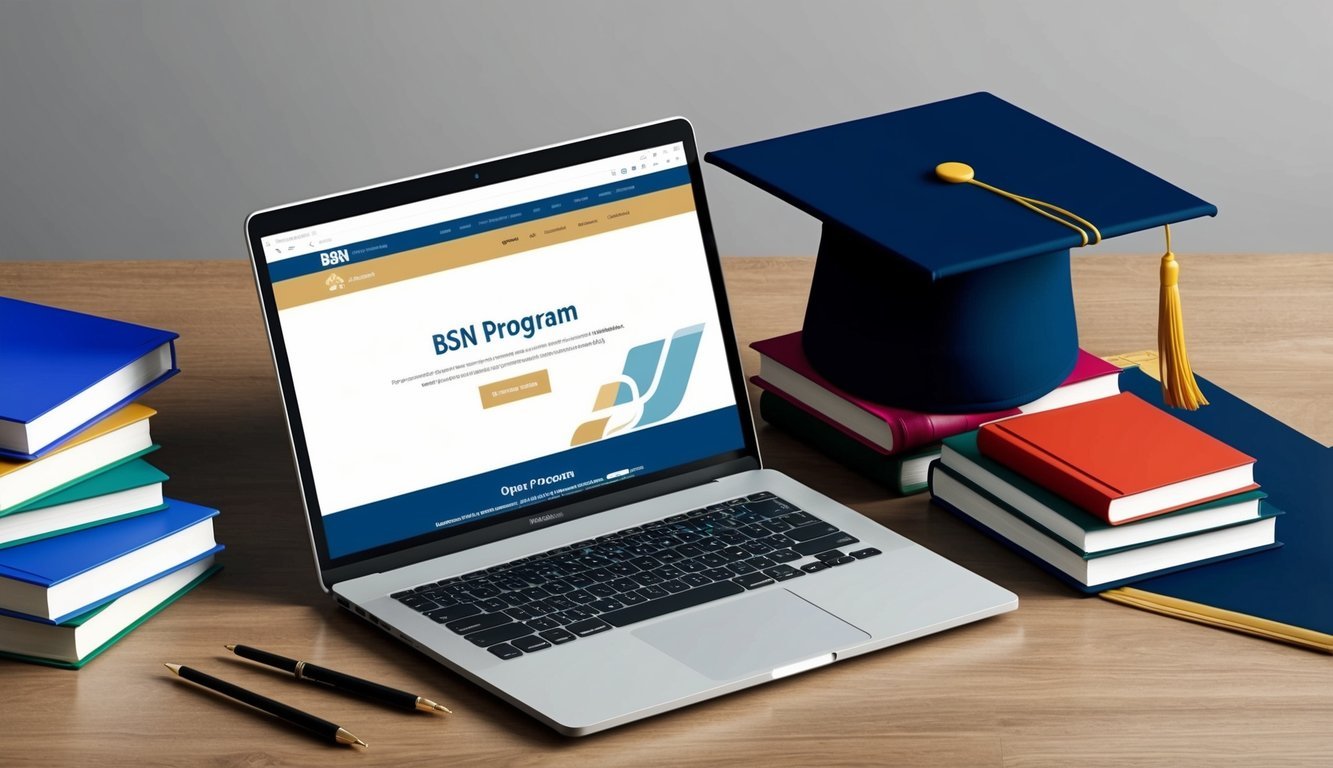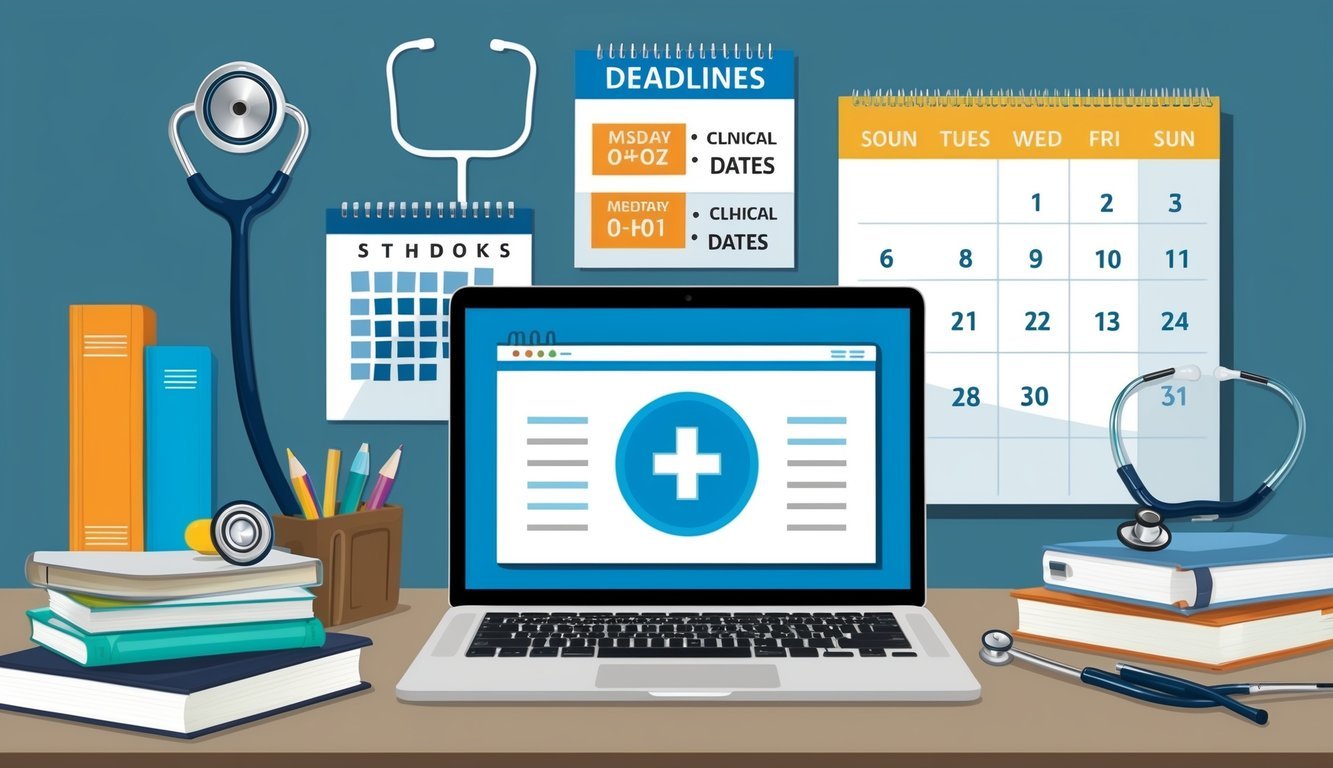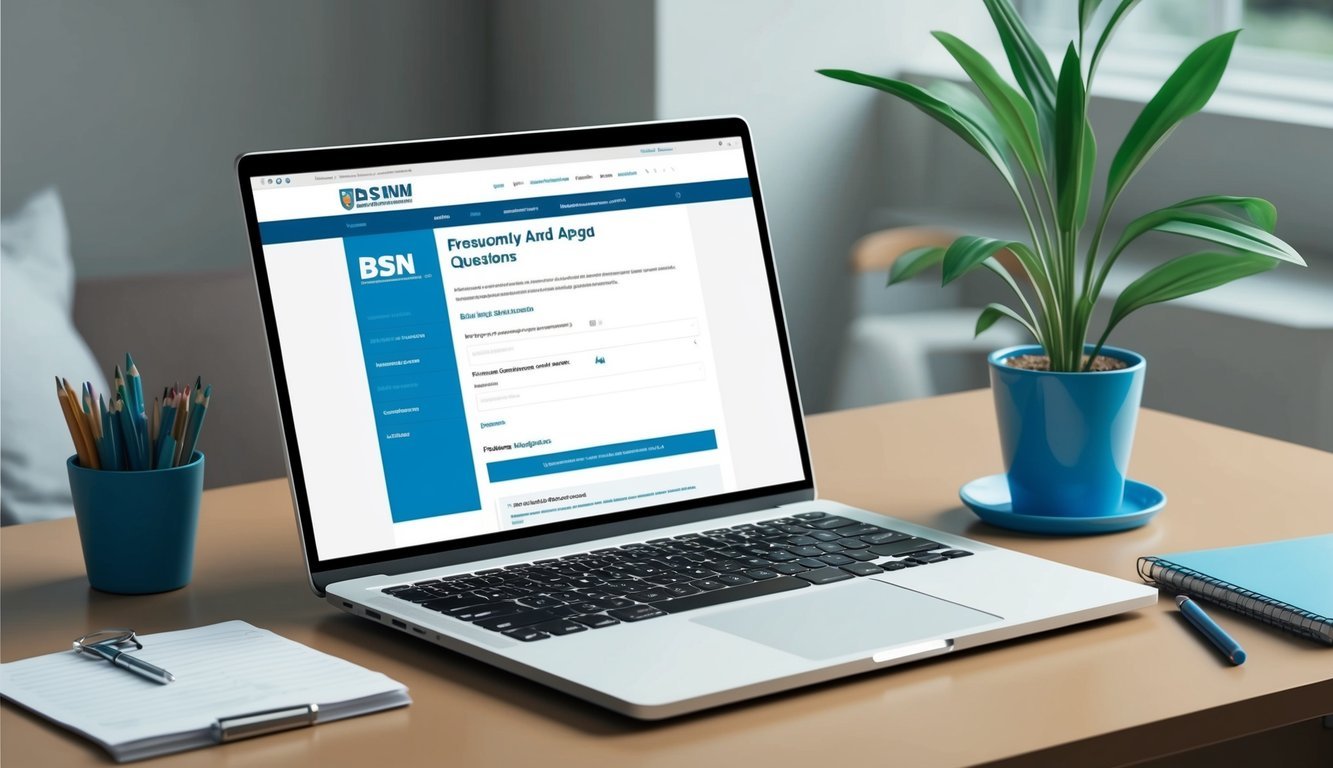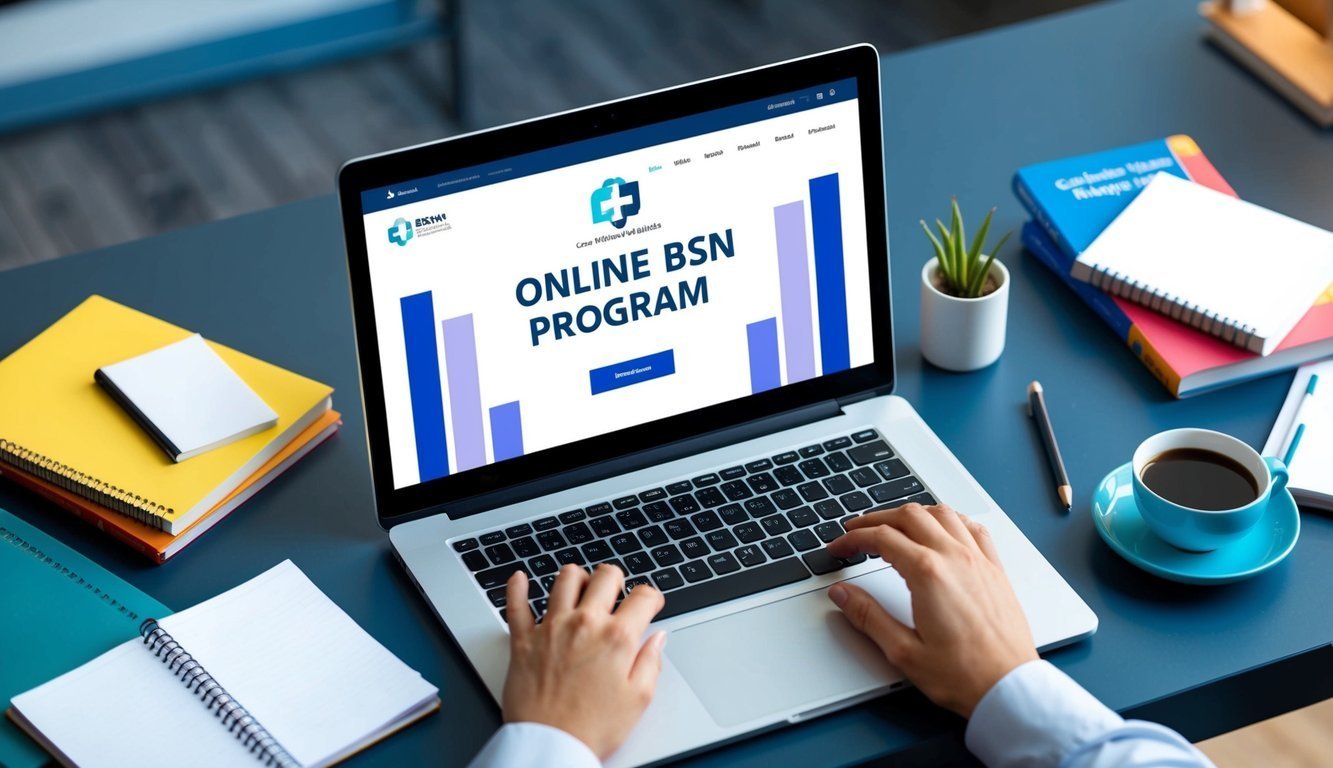Many people wonder, can you absolutely get your BSN online? Yes, you can.
This makes it easier to fit nursing education into your busy life.
As a registered nurse, having a Bachelor of Science in Nursing can enhance your career options and open doors within the healthcare system.
Online BSN programs offer the flexibility you need to balance work and study while preparing for your future.
These programs typically include a mix of online coursework and required clinical experiences.
With various options available, you can find a program that suits your schedule and educational background.
This accessibility allows you to advance your nursing career without the constraints of traditional classroom settings.
If you’re considering furthering your nursing education, exploring online BSN programs might be the perfect path for you.
Key Takeaways
- You can earn your BSN degree through online programs.
- Flexibility in scheduling helps balance work and study.
- Advancing your education can open new career opportunities in nursing.
Exploring Online BSN Programs
Online Bachelor’s of Science in Nursing (BSN) programs offer a flexible path to advance your nursing education.
These programs can lead to various benefits, but it’s vital to understand what a BSN is, the advantages of studying online, and how to assess accredited nursing schools.
What is a BSN?
A Bachelor of Science in Nursing (BSN) is a four-year degree that provides advanced training and education in nursing.
It covers essential topics such as anatomy, pharmacology, and nursing ethics.
A BSN prepares you for a broader range of nursing roles and responsibilities.
It equips you with critical thinking and leadership skills needed in today’s healthcare environment.
Many employers prefer BSN graduates because they often provide better patient care and have a deeper understanding of healthcare systems.
To practice as a registered nurse (RN), you need a valid nursing license, which typically requires passing the NCLEX-RN exam after earning your BSN.
Benefits of Earning a BSN Online
Choosing to earn your BSN online has several significant benefits:
- Flexibility: Online programs let you study at your own pace. This allows you to balance work, family, and education.
- Cost-Effectiveness: Online degrees can save you money on commuting, housing, and campus fees. Some online programs offer lower tuition rates compared to traditional schools.
- Accessible Resources: You can access course materials and support services anytime and anywhere, making learning more convenient.
Additionally, many online BSN programs offer clinical experiences close to home, helping you fulfill required hands-on training without relocating.
You can explore programs like the Chamberlain BSN Online that highlight these benefits.
Assessing Accredited Nursing Schools
When selecting an online BSN program, it’s essential to ensure the school is accredited.
Accreditation validates the quality of the nursing program and its adherence to academic standards.
Look for programs accredited by recognized bodies, such as the Commission on Collegiate Nursing Education (CCNE) or the Accreditation Commission for Education in Nursing (ACEN).
To assess nursing schools, consider these factors:
- Reputation: Research program rankings and read reviews from current or past students.
- Curriculum: Check that the program includes essential nursing topics and clinical experiences.
- Support Services: Evaluate what support tools, such as tutoring or career services, are available to online students.
Finding an accredited school like those listed on NurseJournal can significantly impact your nursing career.
Admission Criteria and Process

When pursuing a Bachelor of Science in Nursing (BSN) online, understanding the admission process is vital.
Different programs may have specific requirements, but there are common criteria you should be aware of as you prepare your application.
Understanding Admissions Requirements
Most online BSN programs require specific steps and criteria for admission.
Key requirements may include:
-
A valid nursing license: You need to be a registered nurse (RN) with an active license. This usually follows earning your Associate Degree in Nursing (ADN) or a nursing diploma.
-
Minimum GPA: Many programs set a minimum GPA, often around 2.5 to 3.0, from your previous college coursework.
-
Prerequisite courses: You might need to complete certain courses, such as anatomy and physiology, before applying.
-
Application forms: Completing the application and submitting documents like transcripts and a personal statement is crucial in the process.
Be sure to check each program’s specific admissions page, like Chamberlain University, for detailed programs.
Transferring Credits and Prior Learning
Transferring credits from your previous education can help speed up your BSN completion.
Many online programs allow you to transfer relevant coursework from:
-
ADN programs: Credits earned during your associate degree can often carry over to your BSN program.
-
Other nursing courses: If you’ve taken additional nursing courses, inquire about their transferability.
To facilitate this process, gather and submit:
-
Official transcripts: This means sorting official documents from previous schools.
-
Course syllabi: Some schools may request detailed syllabi to assess the content of your courses.
Additionally, look into options for earning credit for prior learning through assessments or exams.
This may help you fulfill elective requirements and shorten your time in the program.
For more information, consider checking resources like NurseJournal.
Curriculum and Clinical Requirements

Pursuing a BSN online encompasses a thorough curriculum coupled with essential clinical experience.
The coursework is designed to equip you with the necessary skills and knowledge for effective nursing practice.
Clinical hours play a vital role in your education, allowing you to apply what you’ve learned in real-world settings.
Core Subjects in Nursing Education
Your nursing education will include core subjects that form the foundation of your practice.
Key courses generally cover:
- Health Assessment: You’ll learn how to assess patients effectively, focusing on their health needs.
- Evidence-Based Practice: This subject teaches you to base your nursing interventions on solid research.
- Community Health: Understanding public health principles is critical for broadening your impact on diverse populations.
In addition, clinical nursing coursework will address specialized topics such as pharmacology and nursing ethics.
Completing these courses prepares you for the complexities of patient care.
Importance of Clinical Hours and Experience
Clinical hours are a critical part of your BSN program.
These hours allow you to gain practical experience through clinical rotations, where you work under the supervision of experienced nurses.
During these rotations, you will:
- Apply the principles learned in your courses
- Gain hands-on experience in various settings, such as hospitals and community health facilities
- Develop skills in patient care and clinical decision-making.
Most programs require a set number of hours to ensure you are well-prepared for nursing practice.
This experience is crucial for mastering the clinical aspects of nursing.
Specializations in Nursing
After completing your core BSN program, you may have the option to specialize in areas like Family Nurse Practitioner or Community Health Nursing.
Specialization often requires additional coursework and clinical hours focused on your chosen field.
- Family Nurse Practitioner: Focuses on family-centered care and preventive health.
- Community Health: Concentrates on health promotion and disease prevention in specific populations.
These specializations can enhance your career opportunities and allow you to make significant contributions to patient care within your community.
Licensing and Certification
To work as a registered nurse, you must meet specific licensing and certification requirements.
Understanding these processes is essential for a successful nursing career.
This section covers how to prepare for the NCLEX-RN examination and the steps to obtain your nursing licensure.
Preparing for the NCLEX-RN Examination
Before you can practice as a registered nurse, you need to pass the NCLEX-RN examination.
This test assesses your knowledge and skills necessary for safe nursing practice.
Tips for Preparation:
- Study Resources: Use textbooks, online courses, and practice questions. Websites like NCSBN provide valuable resources.
- Study Plan: Create a schedule to cover all content areas. Focus on weak subjects while maintaining your strengths.
- Practice Tests: Take multiple practice exams to familiarize yourself with the test format and improve time management.
The NCLEX-RN pass rate can vary by state, so staying updated on requirements for your region is crucial.
Your preparation efforts will greatly influence your chances of passing.
Obtaining Nursing Licensure
After successfully passing the NCLEX-RN, the next step is obtaining your nursing licensure.
Each state has different requirements, so check with your local Board of Nursing.
Steps to Obtain Licensure:
- Complete Application: Fill out the application for licensure provided by the state board.
- Fees: Pay any associated fees. The costs can vary widely by state.
- Background Check: Be prepared for a criminal background check, which is standard for nursing applicants.
- Receive License: Once approved, you will receive your nursing license, allowing you to work as a registered nurse.
For specific information, visit your state’s Board of Nursing website for detailed licensing information.
Advancing Your Career with a BSN
Earning your Bachelor of Science in Nursing (BSN) can create new pathways in your career.
It enhances your skills and qualifications, making you more valuable to healthcare employers and better equipped to improve patient outcomes.
Opportunities for BSN Graduates
With a BSN, you can access various career options in nursing.
Many healthcare employers prefer or require this degree for certain positions.
This makes you a strong candidate for roles such as:
- Clinical Nurse Leader: Coordinates patient care and improves outcomes.
- Nurse Manager: Oversees nursing staff and operations in healthcare settings.
- Public Health Nurse: Works in community health, focusing on wellness and prevention.
Graduates can also aspire to roles in nursing leadership, where you can significantly impact patient care and operations.
According to the ANA, BSN nurses can earn higher salaries than Associate Degree in Nursing (ADN) graduates, with averages reaching $81,220 annually.
This not only improves your financial standing but also enhances your job security in a field facing a significant nursing shortage.
Continuing Education: From BSN to MSN
Pursuing a Master of Science in Nursing (MSN) can further boost your career.
An MSN opens doors to advanced practice roles such as Nurse Practitioner or Nurse Educator.
Many nursing schools offer flexible online MSN programs that accommodate your schedule.
This allows you to balance work and study without taking extensive time off.
With higher education, you also build essential skills like research, critical thinking, and leadership.
These skills prepare you for challenges in healthcare and elevate your ability to lead nursing teams and improve patient outcomes.
Investing in your education not only benefits your career but elevates the entire nursing profession.
For more information on educational paths in nursing, visit resources like NursingWorld.
Frequently Asked Questions

You may have many questions about pursuing a BSN online.
This section addresses common inquiries about prerequisites, duration, costs, accreditation, benefits, and clinical experiences related to online BSN programs.
What are the prerequisites for enrolling in an online BSN program?
Most online BSN programs require you to hold an associate degree in nursing (ADN) or a diploma in nursing.
You may also need a valid RN license.
Some programs ask for a minimum GPA and completion of specific coursework, such as statistics or anatomy.
How long does it typically take to complete a BSN program online?
Completing an online BSN program usually takes about 18 to 24 months if you are studying full-time.
Part-time options may extend the duration to 3 years or more.
The exact time may depend on your course load and the program requirements.
What is the cost range for online RN to BSN programs?
The cost of online RN to BSN programs can vary widely.
Typically, you might pay between $10,000 to $30,000 for the entire program.
Factors that influence costs include school reputation, program length, and in-state versus out-of-state tuition rates.
Are online BSN programs accredited, and how does this affect their credibility?
Yes, many online BSN programs are accredited by recognized agencies.
Attending an accredited program is essential, as it impacts your ability to take the NCLEX-RN exam and acquire licensure.
Accreditation also affects your transfer credits if you decide to pursue further education.
What are the benefits of pursuing a BSN online versus through traditional on-campus programs?
Studying for your BSN online offers flexibility, allowing you to work while you learn.
It can be easier to manage your time with online classes.
Additionally, online programs often provide a wider choice of schools and specializations compared to local options.
How does the clinical experience component work in an online BSN program?
In online BSN programs, clinical experience is usually a requirement.
You will complete hands-on clinical hours at a healthcare facility near you.
Programs often help you find placements to ensure you meet the necessary practice requirements for your degree.

